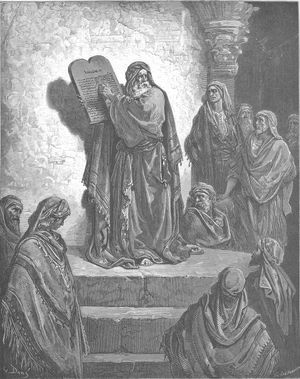The Sabbath Year Release
- Details
- Category: The Sabbath Equality
Yahweh’s Sabbath day commandment, unparalleled and unique in the ancient world, mandates a weekly rest for everyone, including women, slaves, migrant workers and even animals. But Yahweh’s Sabbath extends far beyond the week, as he decrees a Sabbath Year of rest every seven years. Yahweh is indeed the creator of the original sabbatical!
1. Sabbath for the Land
The LORD spoke to Moses on Mount Sinai, saying: Speak to the people of Israel and say to them: When you enter the land that I am giving you, the land shall observe a sabbath for the LORD. Six years you shall sow your field, and six years you shall prune your vineyard, and gather in their yield; but in the seventh year there shall be a sabbath of complete rest for the land, a sabbath for the LORD: you shall not sow your field or prune your vineyard. You shall not reap the aftergrowth of your harvest or gather the grapes of your unpruned vine: it shall be a year of complete rest for the land.
Lev 25:1-5
Rest for the earth every seven years! No agricultural activity shall be done in the land. Yahweh administers unbiased justice, not only for humans and animal life, but for the eco-system as well. As the weekly Sabbath day dictates, one human’s desires cannot violate another’s justified rest, be it a fellow man or a woman or a farm animal. Likewise, the Sabbath Year decrees that no human want shall desecrate the land’s justified rest. The land has worked for the people for six years, and now it deserves a year off.
unbiased justice, not only for humans and animal life, but for the eco-system as well. As the weekly Sabbath day dictates, one human’s desires cannot violate another’s justified rest, be it a fellow man or a woman or a farm animal. Likewise, the Sabbath Year decrees that no human want shall desecrate the land’s justified rest. The land has worked for the people for six years, and now it deserves a year off.
1.1 Yahweh owns the Earth
When Yahweh liberates the people from the Egyptian Empire’s oppression, he claims them as his own subjects. And that means they are free people, with the Sabbath day’s rest as a sign and exhibition of that freedom (Deut 5:15). Likewise, under Yahweh’s reign, the land is free as well. He declares -
"...for the land is mine; with me you are but aliens and tenants"
Lev 25:23
And with this declaration of ownership of the land, Yahweh frees it from slavery under humans. In this view, the Earth is not just a lifeless object ripe for exploitation, but it’s rather a subject that needs care and rest.
Non-stop agriculture eventually turns the soil barren. Its usage should be limited and balanced. And since God owns the Earth, no human can claim to own it himself. God is the ultimate landowner and he decrees it to be free every seventh year. It is a periodic release for the land from labor, as determined by its rightful owner.
1.2 A Return to the Original Eden Economy

If the land is to be rested for a whole year every seven years, what are people supposed to consume during the Sabbath year if they are not to farm the land? Yahweh foresees such questions and answers –
Should you ask, “What shall we eat in the seventh year, if we may not sow or gather in our crop?” I will order my blessing for you in the sixth year, so that it will yield a crop for three years. When you sow in the eighth year, you will be eating from the old crop; until the ninth year, when its produce comes in, you shall eat the old.
Lev 25:20-22
When Yahweh fed the people with Manna from the heavens in the wilderness, he ensured they got a double portion on the sixth day of the week so that they can rest from collection on the Sabbath day (Exodus 16:26, 29). Likewise, he promises a bountiful harvest on the sixth year that shall last way past the seventh year.
But during the Sabbath year, land that is left uncultivated might produce something on its own. And if it does, who gets to consume it? The answer is striking -
You may eat what the land yields during its sabbath—you, your male and female slaves, your hired and your bound laborers who live with you; for your livestock also, and for the wild animals in your land all its yield shall be for food.
Lev 25:6-7
Yes, everyone can eat for free from what naturally grows on the uncultivated land. And this provision from Yahweh, as usual includes the most vulnerable of the society, the free and the slave, the landowner and the landless, male and female, and then goes further by covering not only the typical farm animal, but also wild life. And they all get to eat for free. This is a return to the original Eden economy that existed when Yahweh had created the world -
God said, “See, I have given you every plant yielding seed that is upon the face of all the earth, and every tree with seed in its fruit; you shall have them for food. And to every beast of the earth, and to every bird of the air, and to everything that creeps on the earth, everything that has the breath of life, I have given every green plant for food.” And it was so. God saw everything that he had made, and indeed, it was very good. And there was evening and there was morning, the sixth day.
Genesis 1:29-31
Food during the Sabbath Year is not for money! It is Manna from the Earth, it is free and has to be shared with your fellow human, beast and bird. It does not matter whether the Manna rains down from the Heavens or grows out of the Earth, it is Yahweh’s gift and it is for all his creations. With the Sabbath Year mandate, Yahweh brings home the point that the original Eden Economy of “Free Food for All” needs to be periodically restored and remembered. Every sabbath year, the earth’s eco-system and all the life in it are restored back to their original solidarity and kinship that existed during Yahweh’s Genesis Sabbath.
The Sabbath year does away with perennial and predatory land ownership and declares the right to food for all. Every seven years, Yahweh puts his people to the test on claims to private property and scoffs at the hierarchical class division based on it. In his Sabbath year, even the lowest in that pecking order i.e., domesticated animals and wild animals, share the same table for food with those at the top i.e., the landowners, and with everyone in-between.
1.3 A True Sabbatical for All
Since ancient Israel was an agricultural economy, a rest for the land means a year of rest for almost all the workers in the country. Every seven years, everybody gets a year off work. A true recurring Sabbatical for all people. From the constant churn and burn of the monotonous daily life, Yahweh demands not only you take a day off every seven days, but also a year off every seven years.
In the ancient world, this would mean turning to a year of idyllic life. It gives a chance for people to take a step back, reflect and enjoy the fruits of their labor from the past years, and maybe spend time on their passions and artistic endeavors. It makes the society more humane and improves morale. This holds good even today. In an article on Time titled "The Urgent Case for Sabbaticals for All" (Nov 16, 2021), DJ Didonna of the Sabbatical Project discusses the results of their research which found that sabbaticals made a huge difference in creating "a psychological safe space" where people could figure out how to live "a more authentic life." A Sabbatical rather than a mere vacation was needed because it takes months, not a few days or weeks, to heal from "burnout and workaholism". After taking a sabbatical, nearly everyone reported "renewed energy, creativity, and confidence." Some were even able to make major life decisions in relation to careers, relationships and family.
1.4 A Year of Learning & Faith
The Sabbath Year also offers a chance for the people to refresh their knowledge of the laws and commandments of Yahweh that govern their society -

Moses commanded them: “Every seventh year, in the scheduled year of remission, during the festival of booths, when all Israel comes to appear before the LORD your God at the place that he will choose, you shall read this law before all Israel in their hearing. Assemble the people—men, women, and children, as well as the aliens residing in your towns—so that they may hear and learn to fear the LORD your God and to observe diligently all the words of this law, and so that their children, who have not known it, may hear and learn to fear the LORD your God, as long as you live in the land that you are crossing over the Jordan to possess.”
Deut 31:10-13
Thus, this year of rest also helps parents teach their children the unique laws of Yahweh and thus ensure future citizens are ready to operate in this society which is so unlike any other in the ancient world.
And very similar to the weekly Sabbath rest, the Sabbath year is also a test of the people’s faith towards Yahweh. During the times of the Manna in the wilderness, the people were expected to show faith in Yahweh that the food that rained down from the sky on the sixth day of the week will prove to be enough for two days so that they do not venture out to collect it during the seventh day Sabbath (Exodus 16:26, 29). Likewise, during the Sabbath Year, the people have to trust in Yahweh that the food that grew out of the land from the sixth year and what naturally grows in the uncultivated land during the seventh proves good enough not only for their own needs but for any living being in the society. And faith in God helps landowners to boldly share the land’s growth with others. The Sabbath year is truly a massive display of faith in Yahweh by the society as a whole.
2. The Sabbath Release
The Sabbath year is also called the Year of the Release (Deuteronomy 15:9). The Hebrew root word ‘shemmitah’ is an apt term for ‘release’. We know the land and the people are ‘released’ from the burden of work during this seventh year (Lev 25:1-5). But the concept of release is applied not just in those areas, but also expanded to the realm of credit and debt.
2.1 Debt Release
Yahweh demands that all debts be released on the Sabbath year.
Every seventh year you shall grant a release of debts. And this is the manner of the release: every
Deut 15:1-7creditor shall release the claim that is held against a neighbor, not exacting it of a neighbor who is a member of the community, because the LORD’s release has been proclaimed. Of a foreigner you may exact it, but you must release your claim on whatever any member of your community owes you. There will, however, be no one in need among you, because the LORD is sure to bless you in the land that the LORD your God is giving you as a possession to occupy, if only you will obey the LORD your God by diligently observing this entire commandment that I command you today. When the LORD your God has blessed you, as he promised you, you will lend to many nations, but you will not borrow; you will rule over many nations, but they will not rule over you. If there is among you anyone in need, a member of your community in any of your towns within the land that the LORD your God is giving you, do not be hard-hearted or tight-fisted toward your needy neighbor.
During the Sabbath Year, Yahweh challenges not only the control of landownership by decreeing that the land’s produce will be shared by all (Lev 25:6-7), but also the power of money, by declaring a cancelation of all debts. There’s a limit to the rule of property and money!
Loans to “foreigners” are exempted from this release (Deut 15:3). Superficially that could seem like discrimination and could lead one to wonder how the always consciously all-inclusive Yahweh makes this exemption. When we study ancient clan-based agricultural economies like Israel, we find that the loans made to locals are usually sustenance loans whereas those given to foreigners are commercial loans. In essence, Yahweh’s demand is for all debt to be canceled except commercial loans.
In the ancient world, there have been debt cancelations announced in other nations occasionally when a new king takes the throne or when a ruler feels generous on a birthday or an anniversary. Yahweh, however, stands unmatched in seeking to establish a regular cycle of debt release. He mandates a social re-distribution every seven years. The people will not become indebted to a few at the top. There shall be no abnormal wealth concentration in the society. This is Yahweh’s Manna Economy, not Joseph’s Money Economy.
And in this economy, if you are doing well financially, you are expected not to oppress those who are in need, but rather help them out and “not be hard-hearted” towards your suffering neighbor (Deut 15:7). Many who heard this commandment then would have remembered someone who actually was hard-hearted to them back when they were miserable in Egypt. Only a fool would harden his heart like the Pharaoh had done. Unlike the oppressive economy of the Empire, in Yahweh’s Manna Economy, the goal for everyone in society would be that “there will be no one in need among you” (Deut 15:4).
2.2 Debt Slave Release
Yahweh’s Sabbath year is a Year of Release not just for material debt, but also for human labor debt.
If a member of your community, whether a Hebrew man or a Hebrew woman, sells himself or herself to you and works for you six years, in the seventh year you shall set that person free.
Deut 15:12
In ancient society, usually such “selling himself/herself” to someone happens when a person is in debt and as the Sabbath Year brings the cancelation of all debts, this bonded labor debt is also covered in that release. And when such a release is given to those debt slaves, the creditor is expected to not send them away empty-handed, but rather generously provision them with cattle, grain and wine.
And when you send him out from you a free person, you shall not send him out empty-handed. Provide liberally out of your flock, your threshing floor, and your wine press, thus giving to him some of the bounty with which the LORD your God has blessed you. Remember that you were a slave in the land of Egypt, and the LORD your God redeemed you; for this reason I lay this command upon you today.
Deut 15:13-15
And this command is accompanied with a reminder on how the Israelites themselves were under slavery in Egypt. The people are never to forget that they themselves had once been permanent slaves under the boot of the Empire with no freedom in sight, so the seventh-year release operates as part of a system of checks and balances that are in place to avoid a recurrence of such imperial practices in this society. When Yahweh had rescued the people towards their freedom, he had ensured their previous masters shared their wealth with the outgoing freed slaves, and now the Israelites are to act the same way on the other side of the deal.
I will bring this people into such favor with the Egyptians that, when you go, you will not go empty-handed; each woman shall ask her neighbor and any woman living in the neighbor’s house for jewelry of silver and of gold, and clothing, and you shall put them on your sons and on your daughters; and so you shall plunder the Egyptians.”
Exodus 3:21-22
The Sabbath Year is intimately tied to the history and origin of the free people of Yahweh.
Read Next: The Jubilee Year Liberty
